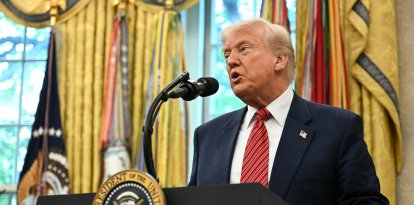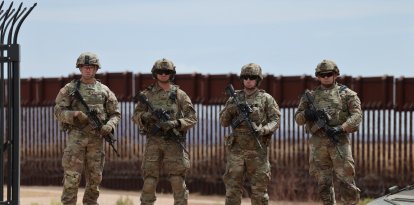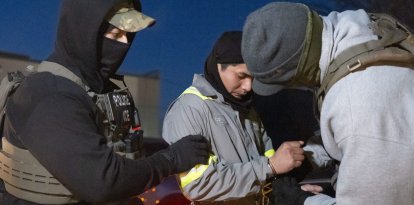Boeing came under intense scrutiny in Senate hearings over the safety and manufacturing of its planes
Senators and whistleblowers raised concerns about the January incident on the Alaska Airlines flight, where a 737 MAX 9 aircraft sustained a panel detachment.
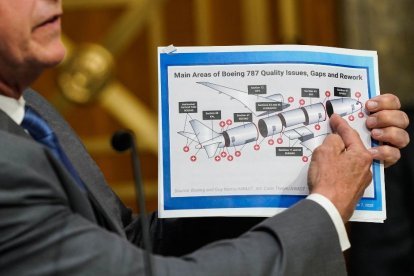
El senador Roger Marshall sostiene un gráfico que ilustra los problemas de calidad de un avión Boeing 787. (AFP)
The American multinational company Boeing faced two tough separate hearings in the Senate that put the safety and manufacturing of its planes under intense scrutiny.
Both hearings focused on the mid-flight panel explosion of a virtually new Alaska Airlines plane last January, which created a public image crisis for Boeing, whose planes continued to suffer damage or incidents in the following months.
The company also had to address concerns that it prioritized profits over safety. Four whistleblowers accused the company of promoting a poor safety culture that resulted in the manufacturing of imperfect and less safe aircraft for the public.
“They are putting out defective airplanes,” said engineer Sam Salehpour, who spoke before the U.S. Senate Permanent Subcommittee on Investigations. “Boeing hid problems, pushing pieces together with excessive force to make it appear that the gaps don’t exist.”
The engineer mainly spoke about Boeing's 787 Dreamliner model, one of the models most used by airlines for commercial flights, especially on international routes.
Specifically, Salehpour claimed that workers at a Boeing factory used excessive force to jam sections of the Dreamliner's fuselage. According to his testimony, this situation could compromise the carbon composite material used for the plane's structure.
The engineer also said he studied Boeing's internal data, concluding "that the company is taking manufacturing shortcuts on the 787 program that could significantly reduce the airplane’s safety and the life cycle."
Likewise, the engineer reported that when he raised this concern, his supervisor elegantly invited him to stop asking uncomfortable questions. According to his testimony, his boss asked him if he was part of the team or not, something that Salehpour interpreted as a “Are you going to just shut up?”
At that same hearing, former Boeing CEO Ed Pierson accused the company of a “criminal cover-up” in the government's investigation into the January explosion of the fuselage panel aboard Alaska Airlines' Boeing 737 MAX.
Regardless of their political group, the senators were stunned by the complaint they were hearing.
As if that were not enough for the American multinational, Salehpour and Pierson's testimonies were not the only ones to embarrass Boeing. Boeing now faces a restructuring due to the public relations crisis and multimillion-dollar losses estimated to be 20% of its operating profit margin.
In another hearing on April 17, the Senate Commerce Committee heard testimony from members of a group of experts that detected irregularities in Boeing's safety culture.
In agreement with Salehpour's statement, MIT aeronautics professor Javier de Luis, a member of the expert panel, stated that Boeing employees hear their managers talk about safety; however, the workers also feel pressure to check the planes quickly and leave the factory as soon as possible.
When asked about Boeing workers' internal feelings, de Luis stated that “there was a very real fear of payback and retribution if you held your ground.”
At the beginning of the week, Boeing denied accusations against it regarding negligence in safety matters and, above all, concerns about alleged retaliation against its workers.
Specifically, the company said that retaliation against its employees is wholly prohibited and stated that internal complaints have increased by 500% since the January accident of the 737 MAX 9 model.
This Wednesday, after the testimonies, the company responded to the accusations and insisted again that it has absolute confidence in the safety of the most questioned MAX and Dreamliner models.
Boeing said, “A 787 can safely operate for at least 30 years before needing expanded airframe maintenance routines. Extensive and rigorous testing of the fuselage and heavy maintenance checks of nearly 700 in-service airplanes to date have found zero evidence of airframe fatigue.”
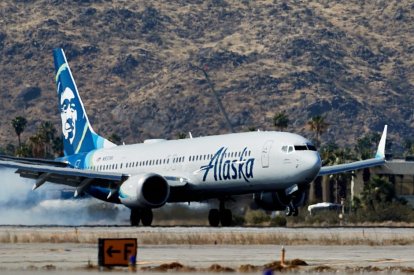
An Alaska Airlines Boeing plane.
An Alaska Airlines Boeing, in a file photo. (Cordon Press)
But the powerful testimony today made an impact in the Senate.
The ranking Republican member of the Commerce Committee, Wisconsin Sen. Ron Johnson, said that even though airplanes remain the safest mode of transportation, he worries when he gets on Boeing's disputed models.
“It’s what I keep telling myself when I go on an airplane. And even when I hop on a 737 MAX,” Johnson said. “But I have to admit, this testimony is more than troubling.”
Senator Ted Cruz (R-TX ), joined by his Democratic counterparts, also made a similar criticism: “Flying commercial remains the safest way to travel, but understandably, recent incidents have left the flying public worried. The perception is things are getting worse.”
RECOMMENDATION
